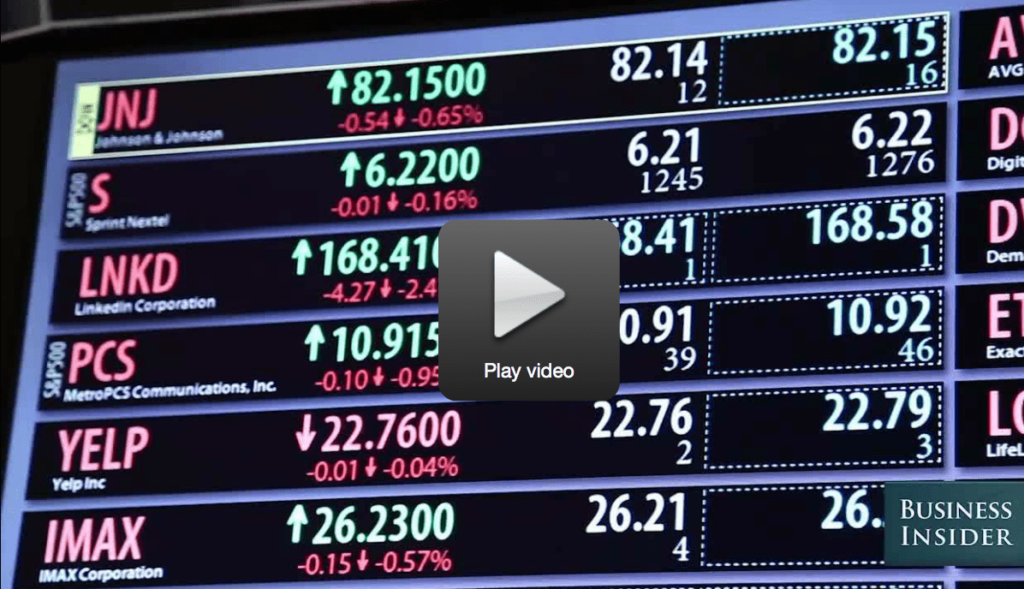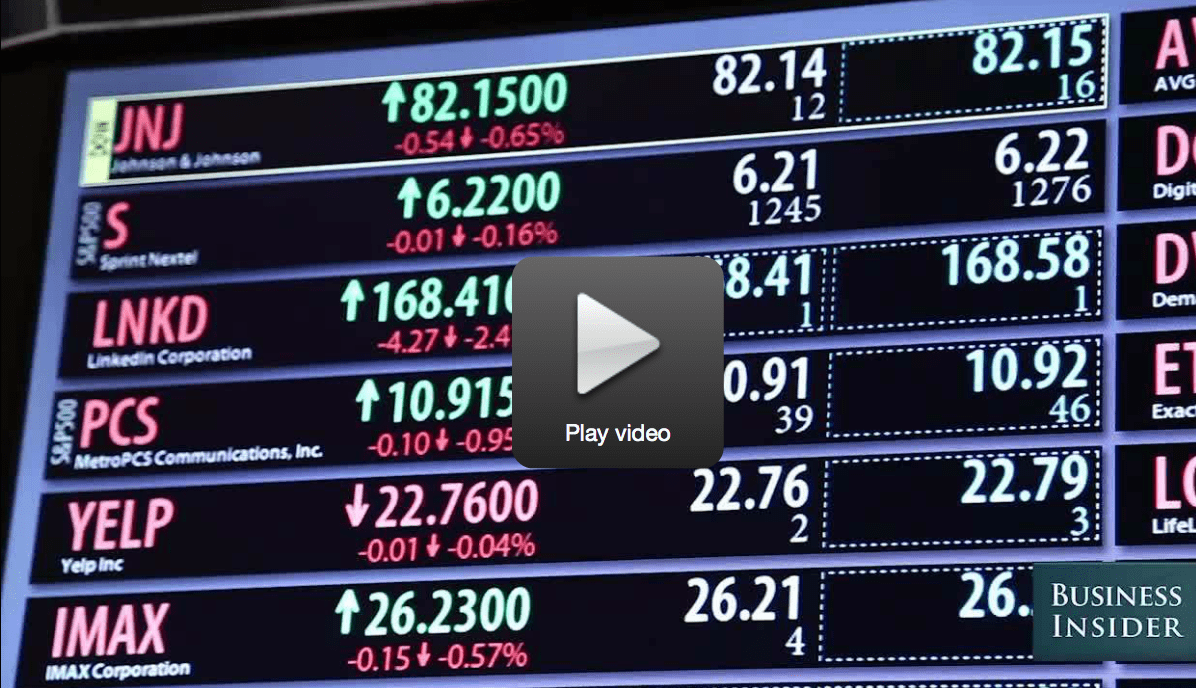The Destruction of the Canadian Investor: Why the TSX Venture is Failing
Dear Readers,
There are many great things about being Canadian. Sadly, being an investor isn’t one of them. Not anymore.
Last week, we revealed the shocking truths of high frequency trading (HFT). I saw some great comments and discussions from you guys and very thankful for your contributions.
This week, I am going shed some light on why the TSX Venture is failing.
Most of you probably invested in a company listed on the commodities-focused TSX Venture within the last year, which means most of you probably lost some money.
On a year-over-year basis, the TSX Venture is down 30%, trading volume down around 25%, and transactions are down more than 45%.
While the commodities and precious metals market have slumped due to falling prices and rising costs, many of the companies that have fallen have not dropped because of core fundamentals.
The TSX Venture as a whole has succumbed to more than just a down-dip in metal prices or the rises in costs of production and exploration. This letter is intended to address some of the issues that have led to the crash of the TSX Venture.
These issues include how the big banks are forcing juniors out of the market, just like they have in the US, and also how one regulation has turned into a death spiral event leading to other regulations that collectively are crushing our Canadian market.
It’s important that Canadians know what is really going on.
Transparency in Trades
The biggest and most important aspect of any stock-trading platform is transparency.
Investors should be able to see exactly how many bids and sell orders are available for a stock at any given time – especially for an exchange that has minimal liquidity and therefore much easier to manipulate. This is how investors calculate at what price he/she should place a buy or sell order.
The depth of the market can be seen using a paid service called Level II that gives you access to the order book in real time. I have always said that anyone who trades should pay for such a service. However, even with this service, you’re far from being protected.
Especially since regulators decided to enforce what they believe to be fair competition on the TSX and TSX Venture…
Multiple Trading Platforms
Many retail investors I speak with have no clue that there are multiple parallel trading platforms for the stocks they buy in Canada.
Canadian regulators forced the TMX Group, the parent of the TSX and TSX Venture exchanges, to allow trading through alternative trading systems operated by third parties because they felt there should be fair competition in the market of buying and selling stock in Canada.
As a result, there are now many alternative market centers that process trades for stocks listed on the TSX and TSX Venture. Some of these include Alpha Trading Systems, Chi-X Canada, Pure Trading, Omega ATS, and dark pool Match Now.According to Stockwatch:
“Alternative trading systems in Canada handled 33.7 per cent of trading volume during the week ended May 3, 2013.
…The Toronto Stock Exchange and the TSX Venture Exchange handled the other 66.3 per cent.
…Looking at securities listed only on the TSX, the exchange captured 61.2 per cent of volume. Chi-X handled 18.3 per cent, Alpha had 11.7 per cent and together the other ATSs handled the rest, 8.8 per cent.”
As you can see, these alternative trading systems handle a large portion of the trading volume in Canada, yet most regular Canadian investors don’t see this because most quote systems do not include transactions from all of these different platforms.
Furthermore, while volume of trade can be seen by the select few quote platforms that incorporate the volume between these exchanges, none of them combine them in the same bid/ask level II depth because they are being traded on different platforms via parallel order books.
In other words, while you may be trading a stock on one platform, that same stock is being traded on different platforms at the exact same time. This not only removes transparency – especially for the average retail investor – but it also removes visible liquidity for any particular stock.
The retail investor using his/her online trading quote system doesn’t stand a chance – especially when playing on a exchange with little volume, such as the TSX Venture.
But if parallel order books are such an issue, why is it allowed?
Fair Competition
Canadian regulators often do too much in order to solve problems where none exists.
Their job is to protect investors but sometimes their actions have repercussions that actually end up doing the opposite.
Regulators believed they were doing the right thing in the spirit of fair competition by forcing the TMX to accept alternative trading platforms.
However, not only did this cause transparency issues for investors, but it also created a domino effect of other problems that regulators tried to combat with other regulatory amendments.
The October 4, 2012 Notice
On October 4, 2012, the TMX Group sent notice to confirm “trading enhancements,” set to begin on October 15, 2012.
The enhancements in the notice reflected recent regulatory amendments respecting short sale regulation, the introduction of a short marking exempt designation, amendments respecting dark liquidity on Canadian equity marketplaces, and functionality introduced as a result of client demand and market quality initiatives.
When you try to fight one problem with another problem, the result is never positive. I will explain what’s happened in a bit. But first, take a look at the one year chart for the TSX Venture Composite since the rules were announced:

It doesn’t take a rocket scientist to breakdown this chart.
Since the notice of the “Trading Enhancements Update” by the TMX, the TSX Venture has dropped like a rock.
Why?
The Death Spiral
When regulators forced the TMX Group to allow trading through alternative trading systems operated by third parties, it caused real time transparency issues.
When you combine the lack of transparency in parallel trading platforms with the use of High Frequency Trading (discussed last week), regulators had no choice but to eliminate the tick test rule, or uptick rule, for short selling.
Let me explain.
Discontinuing Price Restrictions of Short Sell Orders (Tick Test)
Historically, you could only sell a stock short if the price is higher than the last different price; simply put, you can only short a stock as it was moving up.
However, this rule only works when there is a strict sequence of orders in the order execution book; when bid/ask orders are placed in line on a first-come first-serve basis. But with parallel trading systems, a definitive sequence of different prices can’t be established at any exact given point in time because one order book might show a down-tick, while the other an uptick.
As a result, it would be extremely difficult to enforce the uptick rule.
By allowing competing trading platforms and encouraging HFT (which was believed to create more liquidity), regulators had no choice but to remove the tick test rule. In the October 4th announcement, the rule was eliminated:
“TSX, TSX Venture Exchange (TSXV) and TMX Select will no longer constrain short sell orders to the last sale price. Short sell orders entered will be permitted to trade down to their limit price establishing a last sale price on a down tick. Short Crosses will no longer be constrained by the last sale price.”
This means we can now short a stock anytime we want. That’s great news for shorters, but for companies trying to raise money at higher prices to hire more staff or move their projects forward, this rule change can cripple them – especially under the liquidity constraints of the Canadian market.
It doesn’t take a lot of money to control a stock via short selling on the TSX Venture. As a matter of fact, institutions often hammer stocks via short selling and back up their shorts with warrants they obtained in a previous financing.They often force the price of a stock down to finance the same companies they’re shorting to get a better financing price; or to force a company into a financing arrangement.
Short selling isn’t the only thing destroying the TSX Venture. Another rule change is hurting the market and its one you would never expect.
Dark Pool Liquidity
Hate it or love it, dark pools represent a lot of available liquidity for many institutions – especially independent brokerage houses. Here is a quick video explaining dark pools:
While retail investors rarely participate in this type of trading, there are often benefits to the use of these dark pools in Canada via volume of trade.
Dark Pools is trading volume or liquidity that is not openly available to the public. Dark liquidity pools offer institutional investors many of the efficiencies associated with trading on the exchanges’ public limit order books but without showing their actions to others. Dark liquidity pools avoid this risk because neither the price nor the identity of the trading company is displayed.
There are many advantages to dark pools, especially on the Canadian market.
One of the main advantages for institutional investors in using dark pools is for buying or selling large blocks of securities without showing their hand to others and thus avoiding market impact as neither the size of the trade nor the identity are revealed until the trade is filled.
During a market decline, dark pools can help facilitate big sell orders from fund redemption without having to smash the open market and cause stocks to crash.
Dark pools can also be posted inside the existing limit order book alongside public liquidity, usually through the use of iceberg orders.
Iceberg Orders
Iceberg orders are orders that appear to be small but in reality are much bigger.
The order is queued along with other orders but only the display quantity is printed to the market depth.
When the order reaches the front of its price queue, only the display quantity is filled before the order is automatically put at the back of the queue and must wait for its next chance to get a fill. While not exactly dark, iceberg orders have an advantage of not showing the full sell size of an order to avoid scaring market participants. It can also do the same for buy orders for those that want to purchase more stock without running up the price.
While it may seem unfair that trades exists outside of the public realm during trading hours, trades executed in dark pools are incorporated into a post-trade transparency which means investors do have access to them.
This can aid price discovery because institutional investors who are reluctant to tip their hands in lit market still have to trade and thus a dark pool with post-trade transparency improves price discovery by increasing the amount of trading taking place.
In other words, volume of trade increases. For the Canadian market, that’s a much-needed thing.
New Rules that Affect Dark Orders
On October, the Investment Industry Regulatory Organization of Canada and the Canadian Securities Administrators introduced rules that give lit orders priority over dark orders in the same venue.
Smaller dark orders will now have to offer significant price improvement. Orders under 5,000 shares or C$100,000 dollars in value must offer at least half a tick in price improvement for stocks that have a spread of one tick spread, and a full tick of price improvement for stocks with higher spreads.
While regulators are trying make the market more transparent, industry insiders say the rules will reduce passive liquidity in dark pools and cause routing issues, as dark orders can only execute after all lit market options have been exhausted.
Canadian dark pool Match Now’s parent ITG expects inter-listed equities trading in Canada to drop by 5% as the dark pools route the flow of trade into the US as a result of the new rules:
“We’ll definitely see inter-listed stocks trade more in the US than in Canada because of this rule. Dealers can automatically route inter-listed trades to both US and Canadian venues, so there’s no technological barrier to instantly routing these trades.” – Doug Clark, managing director of research for ITG.
Here is yet another situation where a rule, meant to make the market better, is actually making it worse. Having to hunt for liquidity across all displayed markets before sending an order to a dark pool causes unnecessary confusion:
“There will be many situations when a buyer and a seller can’t interact because of the way routing works around this rule because they create technical issues regulators don’t understand,” Clark said, adding that smaller and mid-sized dealers will struggle to adjust trading strategies, while institutional traders may eventually find a technology work-around to the routing issues.
Again, the smaller guys fail and the bigger banks win.
The October Rules Plague
Dark trading in Canada hit a record high of 5.87% of total trading volume last August.
Dan Kessous, CEO of Chi-X Canada, fears the regulation will limit the use of dark trading, adversely affecting the market:
“There will be less resting liquidity so there will be lower volumes overall, and it will probably get worse over time as people realise they have to change their trading strategies.”
Were his fears warranted?
Here’s the same TSX Venture chart from before, but this time highlighting the record high dark trading month, just before the dark pool rules announcement:

In August, the stock market was rising despite being in the summer doldrums that the TSX Venture is commonly known for. While there is no proven correlation between the Venture’s rise in August and dark pool trading, there’s no doubt that the TSX Venture was rising during a month when dark pool trading was at its highest.
Since October, much of the volume in Canada has been routed to the US for inter-listed companies. Trading volume for inter-listed companies are now much higher on the US exchanges for the majority of the inter-listed companies based in Canada.
The TSX Venture volume is down more than 25% year-over year as of April, and transactions down nearly 45%.
Are the new rules making investing better for us?
Leave a comment and share your thoughts by clicking here
The TSX Venture End Game
Pointing the finger is a pointless act. However, we do need to address the issues of what new rules are doing to our investments in this market.
Is the mood that somber in the commodities market, or are the new regulations adding too much fuel to a fire that should have been much smaller?
As I always say, I am not here to accuse or point fingers, but rather show you some facts and let you make the decision yourself.
This downturn has forced both investors and smaller institutions out of the market, leaving room only for the big boys to play.
The Canadian investment market is being changed to reflect large institutional firms that are only looking for yield products. Independent brokerage firms are drying up because funding for junior projects are drying up as investors have lost too much money to want to play again.
Much of the money remaining is now being filtered to bigger banks and bigger companies.
Juniors on the TSX Venture really don’t stand a chance.
For the average junior, it costs on average around $200,000 just to maintain their listing and legal fees to keep up with regulators. That means a small junior who just raised a million dollars, will need to take 20 cents out of every dollar to comply with security regulations.
It’s no wonder why analysts are predicting that at least 500 companies on the Venture will run out of money before the year is over. Many of these companies have less than $250,000 in the bank. Considering that it takes around $200,000 a year just to comply with regulations, there is a great chance that the analysts are right.
All of this is leading to the demise of the TSX Venture if things don’t change. All over the country, there are town hall meetings to address the issues. But who’s listening?
I believe the market needs strong regulation to prevent scumbags from operating and stealing investor money. But over regulation, and creating regulations that stops the market from moving forward, only loses money for investors and prevents companies from moving forward, innovating, and creating jobs.
Regulators need to be prosecuting those who are clearly ripping people off, and those who are clearly involved in manipulation. The biggest problem is that the biggest manipulators are likely to be the biggest banks with the biggest resources.
Manipulation on the Canadian Market
I have witnessed trades for many stocks where you can clearly see the manipulative efforts of small block sell orders coming through, that appear to be intentionally forcing share price down. Those with real-time Level II will be able to see this activity all day long. Much of this activity runs through the houses of Canada’s biggest banks, and it almost always forces the price of stocks down to a point where liquidity and buy orders have completely dried up and there is no more stock floating around in the system to short.
With the removal of the uptick rule, firms are now shorting at will and destroying companies for small profits. Institutions have many advantages that we don’t. They can short stock and have a fairly lengthy period before they have to replace that stock, should their shorts need to be covered. Even if their shorts need to be covered in a short time frame, they can extend that time frame by borrowing stock owned by their clients.
Too big too fail is sadly a very real scenario. As smaller institutions dry up, investors will transfer over to the bigger guys who will then control more money.
Considering that more than 50% of the world’s financing for resource projects stems from Canada, with a third coming form the TSX and the Venture, the resource sector is not looking very bright.
But don’t think its over. Not for one second.
Foreign Equity Opportunity
Companies are having extreme troubles funding through public vehicles because that money has dried up due to over manipulation and regulation (for now.) But that doesn’t mean capital isn’t available.
As a matter of fact, capital is abundant – especially in foreign countries.
Private equity is growing and foreign capital is looking for a place to call home. Foreign investors not only have an abundant wealth of capital, but they’re looking to deploy it.
I know this because I work with a few very smart individuals to help fund good projects through strategic, private equity, sovereign wealth fund and state-owned enterprise buyers.
Please don’t hesitate to send me information if you’re a company that needs help.
Companies who are smart and have great assets should start looking elsewhere for money.
Until next time,
Ivan Lo














The charts and regulation timings show the realities. What’s missing here is the point blank finger pointing. They call it “short term market inefficiencies”! What outright balderdash.
There’s no way they didn’t see this coming. It’s like telling yourself that driving your car into a cement wall won’t hurt.
We all saw what happened in the USA. Here, they went even nuttier so what do you expect.
What needs to happen is a full judicial inquiry into the matter. See who they are connected to and who benefited. These buggers knew full well what would happen and clearly planned to make it worse.
This only happens when graft is involved. They have no fear of convictions. (Neither did the guys in Montreal). Perhaps we have to wait for Flaherty and his coven to be thrown out of office.
As I’ve said before, this was deliberate and they are achieving their goals. So we need a new self regulated way to conduct business that prevents the old boyz club from getting in.
For more of my opinion go here: http://goldcoppertungsten.blogspot.ca/2013/05/when-price-discovery-function-fails.html
Again, big thanks to Ivan for keeping the focus on this issue. If you have not invited your friends to read Equedia via social media please take the time to do so. The question of who’s listening is important. Ivan can’t just preach to the choir. Help get the message out.
Well said. We know who to blame. The big banks are trying to squeeze the little guys out and they’re coordinating their efforts with the regulators.
Spread the message. G Woody’s opinion also cuts straight to the finger pointing. Great work guys
I agree with all you have said. The sooner they get rid of all the “casino aspects” and get back to simply investing in a stock you like, and not investing in a stock you don’t, nothing will change. All these rules and regulations would not be needed if only simple investing was done. Knowledge of all trading in all companies at any time of the day should be available to everyone. Coordinated Institutional High frequency trading and shorting has destroyed many companies. Take these vehicles away from the institutions and the avg. investor might have a chance.
Just more scams for the bankers in change of running the stock exchange
they all should be fired and put in jail
Your article is very interesting!
As a frequent trader, I am very frustrated by the way my
stockbroker (TD Waterhouse) handle my orders. As an
example, many “Market” orders are filled at a price that
is higher (for buy orders) or lower (for sell orders) than
the price appearing on the quote service (eSignal) that
I use. These prices are not published on the quote services.
Very frustrated!
Never, with any broker, place market orders. The traders will always arbitrage your orders to make money. They love when market orders are placed because it allows them to buy cheap and sell higher, or sell high and buy lower – especially since they can see the full order book.
Bang on G Woody. A major concern I have is with one of Canada’s big banks/brokerages. Scotia Mocatta(BankofNovaScotia) has become one of the top 4 shorters in the Comex silver market. This has commenced in October of last year. If this continues more juniors will be forced out of the mining sector due to the price of silver being lower than what it costs to get it out of the ground. Why the regulators in Canada allow this to happen is beyond me. These juniors need a level playing field and not some big bank forcing them out of business. These juniors are being attacked from all sides without a word from the regulators. We need more regulators that will work for the people, not more regulations.
I would like to known when the tsx rebound …What year .. I have much lost money but no sale yet
Excellent article. Finally someone comments on this very important issue.
PS> In the other article (interview) you mention a report by Natural Resource Holdings. That report does not seem to be online anymore. Would you have a copy? Thanks a lot.
Julien
I will see if I can find and post the report.
tsx-v will not last many more years. many,many people i know refuse to invest in the juniors anymore due to the non-stop shorting. stick a fork in it,it’s done
ETFs are also causing problems and are actually undermining their own supply. It’s the explorers after all who find the stuff. They take all the risk and now face being wiped out.
All the reports I see show declining grades. We are having to try find massive low grade deposits like Galore and Schaft Creek (here in Canada) to fill the void. What I see coming is a compression cycle where new supply dwindles until the very people behind it realize what they’ve done to themselves. You want to see ETFs collapse in a hurry? Wait until those investors come to understand that they cause part of this. Price will go up until they realize the scarcity actually means no supply at all.
This is one of the root causes of Nationalization. So when your ETF is suddenly faced with no supply… it’s out of business.
Oh ya, and all this talk of this just being a cycle? Ah, I don’t think so. Look at the banks who are hording gold. I wonder why that could be. Anyone read the news on Barrick? How about the Pebble deposit, might that never become a mine?
I can only wish the plumbers knew what was happening. A roll of solder is $32! (Not to mention that a 2×4 is now almost $3.50 and I live by saw mills).
Our govt’s say naaaa, no inflation problems folks. $1.40 a foot for 1/2 inch copper pipe is normal. Then add in that PIMCO told it’s investors they would only be able to hold value and not accrue it. Did we really need chapter two of Disaster Economics?
And another real good poke in the eye. The courts dismissed the claim against the Chinese workers here in BC. I guess it’s open season on our Constitution. You must now speak Mandarin Chinese to work as a miner! Something stinks there. I can’t see how a foreign company can over rule our laws, pay cut rate wages and charge head hunter fees while bringing in their own people at the expense of Canadians. I smell a fraud.
Great comments guys. One thing to keep in mind is how shorting really works. Shorting is selling stock you don’t have, in hopes you buy it back at cheaper prices to replace the stock you sold short. But when the big banks, or the custodians, you trade through are holding stock from numerous clients, they essentially have a lot of borrowed stock that can be used to cover should the markets turn.
This really is no different than the banking system, where a bank can lend 10 times the money they don’t have. See this video for some info: http://www.equedia.com/the-best-kept-secrets-of-the-dollar/
I live in Memphis, Tn. ,my only foray into the TSX was a couple years ago on Yellow Media. At the time it paid a great dividend but I could not justify what was going on with the management. They were selling their stock while issuing more shares. Red Flag. They bought a car trading magazine for 1.25 billion and sold it for .70 billion, to raise more cash. at any rate the stock price kept falling to zero after they finally cut out the dividend. The end game was to get into bankruptcy court and screw the stockholders, and sell new stock and start over. Somebody should be rotting in jail over this outrage. Yellow pages are making good money but hate their shareholders for some reason. I was glad to get out with some gain.
LETS SERIOUSLY GET THIS ARTICLE VIRAL AND PUBLISHED EVERYWHERE! FORWARD IT TO EVERY NEWS CHANNEL AND NEWSPAPER. THE MORE OF US THAT DO IT, THE MORE WE WILL FINALLY BE HEARD.
WE HAVE ALL BEEN USED AND OUR HARD EARNED INVESTMENT DOLLARS WASTED AND CONTROLLED.
FORWARD THIS ARTICLE TO AS MANY PEOPLE, AS MANY NEWS SOURCES. SOMEONE HAS TO SHED SOME LIGHT ON THIS.
I agree with Tony. If we all send messages to the news sources, they would have to cover this story eventually.
Forwarding this article to whoever I can.
I was looking to invest in some TSX companies but i am having second thoughts now.I think this manipulation needs to stop now otherwise investors like us wont be investing.
This is another good example how big business thinks about what is really important in the world. “Money and how to make more, as fast as possible, regardless of what their actions do to the rest of the world”. High un-employment, high personnal debt, low savings and retirement balances, high housing costs, high gas prices, high taxes, reduced government spending on healthcare and education, and on and on. Ripping off the markets through manipulation affects everyone and everything, even if you don’t invest. Once again, the top 1 or 2% gain hugely, while the rest of us in the middle and lower class continue to bleed trying to keep the country alive. When everyone starts to think and do “what’s good for the country” rather than thinking: “screw everyone, I want more easy money”, perhaps Canada will once again be strong.
The government body that mandated these changes is clearly corrupt. Everyone who has any experience in securities knows what a disaster the elimination of the uptick rule has been for the USA; it is impossible to be a regulator and still support it unless you have been bought. The fact that a government body involving a number of people brought this about indicates a criminal conspiracy in my mind; it will take legislative action to change the situation, likely preceded by a government investigation. At best it will take years, and since it so clearly involves the banks, including, in all likelihood, the American and Canadian central banks, I seriously doubt that anything can be done. Ultimately, this is likely to mean the failure of all but the very strongest of the publicly held companies and/or their acquisition by banking interests.
The only alternative is a campaign to direct all orders in listed securities to the exchange for execution. This would require the cooperation of the brokerage firms and a massive educational effort, but it is likely to be successful absent overt government intervention of dubious legality. My suggestion would be to approach the exchange membership and relevant brokerage industry groups for support in the process IF you are fairly confident they are not under the control of the large banks. Unfortunately the banks control all the relevant structures in the USA already, however, the TSX Venture is fairly small, and while they will certainly have brokers there under their sway, if they do not control the exchange outright, this would have considerable appeal.
Of course, the exchange would have to implement its own uptick rule, else the entire effort would be for naught.
The unfortunate effect of unbridled shorting on junior stocks is that it has created at least the impression of manipulation in the markets if not actual manipulation. It represents artificial inflation of the number of shares available to the market. This may prove to be akin to a BreX for every company! If foreign investors get a whiff of how the pro traders are ripping them off it could lead to a much larger exodus from Canadian stocks and an even larger degree of distrust of the Canadian market place.
I have noticed some peculiar trading between the different platforms as well for low liquidity stocks.
The banks had already taken over the stock market in Canada and have massively changed the rules and restricted access to the venture market by the average investor.
It seems to me that a major overhaul of the stock market regulation is needed.
This will likely take years to even be brought into the spotlight by politicians, who are likely to be involved in some way or another.
Its like this piece says, the big banks are taking over and they will do anything to accomplish it. to them, sometimes it takes a full cleanse and this is exactly what theyre doing to the venture market.
HFT is supposed to increase liquidity so they remove the uptick rule and now we’re stuck getting hammered with borrowed shares.
I agree with Tony Bell in the comments here. Share this article with as many people as you can and forward it to all of the media hubs so we get this story covered.
Thank you Ivan Lo for shining the light on this topic backed up by some great examples.
You bring up an interesting point regarding peculiar trading for low liquidity stocks. These stocks could not be more transparent given their low volumes and tight share structure, yet there is always stock to be sold in weird ways.
As for regulation overhaul, I agree. But what overhaul is needed? I don’t think everything needs to be changed. Is there anything in particular you would suggest?
It is not only the Stock Markets that are being manipulated, but also the majority of the World’s major Nation’s currencies.
Fiat money reigns these days thanks to these Governments departing from the discipline of having real money in circulation.
This basically results from the pervasive debt-based Monetary Systems in use, whereby Governments sell interest bearing Bonds to cover their deficits.
As Governments are the sole authorities for creating and circulating ‘money’ they do not need to saddle their countries with these exponentially increasing debts-which incidentally can never be completely paid off.
In a way Money and Market manipulations are branches of the same disease, and will unfortunately most likely result in the total collapse of Civilisation as we know it today.
The irony of it is that all these paper money shenanigans will not in the long run profit anyone at all.
I wish everyone good luck for the future.
Roger, did you see http://www.equedia.com/the-best-kept-secrets-of-the-dollar/
literally the same thing as the stock market. the issue is that we have no way around currency manipulation. but someone can easily do something about stocks.
Winston…there is a way. If all the Nation’s population or rather, a vast majority of it were to complain to their MPs about Fiat money and the lack of a stable long-term store of wealth available to all- then the Government has the power to make the required change(s).
However, this is unlikely to occur as most of the ordinary folks have no notion of what money is, or how it is supposed to work, or it’s history. Unfortunately it has never been a subject taught to our children-nor it is ever mentioned in any of the media – in fact it seems to be one they studiously avoid mentioning.
Roger: complaining to MPs about fiat money is like complaining to Ronald McDonald about eating McDonalds. Anytime in our history someone tried to fight the fiat banking system, they got killed. Abraham Lincoln tried to fight it. JFK tried to bring silver back as legal tender. Both were assassinated.
The problem is the banking system. But try shutting that down and bringing the bartering system or gold backed currency is next to impossible.
Charles As an individual complaining what you say is true, but supposedly the way to get change is to bug your MPs, and that doesn’t seem to work. I have written to Finance Ministers for some years past and got BS replies. However, if everyone or most complained and voted accordingly maybe it would cause something to change . Hopefully for the better.
As said before, good luck to all.
These are all very good points… and the worst, IROC’s Accredited Investor Rule, wasn’t even mentioned! A rule that limits access to TSX.Venture financing product to very few investors in our system (market place.) It certainly has contributed to the declining volumes. Getting the participation back is vital to our survival. With out throwing stones, I firmly believe that the intended mandate of investor protection via the AI rule, has had the opposite effect and is a real significant contributor to this serious problem we face now in the junior markets. Clients are not just rolling over and simply saying ‘ok Steve, um then just buy it for me on the offer…’ because they don’t ‘qualify’ for product reserved for accredited investors, re: the cheaper priced units – units that almost always come with an attached sweetener/incentive such as a full or half purchase (reload) warrant – things that retail investors want and feel entitled to as well. Retail investors who don’t meet the high AI rule watermark, are not simply paying up as stated and buying in the market… their saying screw that! And looking else where. The rule has significantly lessened the pool of smart investors who want to own Canadian small cap/junior recourse companies for part of their portfolio, and/or on a 100% basis in their designated ‘speculative stock’ account. Also, there is no longer any wide based ‘distribution’ as a result of this rule – which was a cornerstone of the risk markets/business when I started in the early nineties. And another one of the bad results is liquidity – or lack there of – mostly from the view that there exists so much cheap paper now placed in the hands of very few (AI Qualified) investors! Its no wonder the pubco’s can’t make or better, maintain a market, let alone move to new (higher) levels on improving fundamentals. Profits are profits and accredited investors take them too, mercilessly. There’s just too much paper on the supply side now and too few buyers with ‘real’ bids. There has to be a better mechanism that’s fair and that allows the real retail investor back into this market place. Possibly an exemption that allows an amount, say, $25K Max per household per placement, to subscribe for a non and/or brokered deal? That would bring some retail money back to the pubco’s, and soon get the IA’s talking to their risk accounts again – about new financing placement product. As it stands now, with this enforceable AI Rule, and all of the above… Its over! And that’s a shame for all concerned. So we have to fix this! Steve Livingston, Calgary.
This is very true. The accredited investor rule is not only stupid but prevents so many smart investors from participating. Companies then have to finance from smaller brokerages looking for just fees and then the stocks get hammered back in the market, along with shorting with the warrants
Re: The Destruction of the Canadian Investor
in response to The Destruction of the Canadian Investor posted by abstacey
reply………….
posted on May 27, 13 03:28PM on the Agoracom Club 300 Investment Group Website
I agree with most of what the author says, but I think he’s missed a couple of important factors.
1. Over-issuance of stock. We’ve just had one of the biggest booms in Canadian resource history and as a result, if you could fog a mirror, you could get listed. In a downturn that translates into too many undercapitalized companies with marginal properties. Until they disappear, either through bankruptcy or takeover, expect a weak market.
2. Demographics. Many of the players from the recent boom are older folks approaching retirement, if they haven’t retired already. Priorities shift as you get older – hanging on to what you have is more important than risking money in a weak market. Also, the next generation isn’t as well off which means there are fewer players entering the game as older ones leave.
The first factor is corrected over time through the normal operation of the market – supply and demand come into balance and the risk-reward ratio starts to improve. I’m not so confident on the second factor though. Global unemployment/underemployment appears to be structural, not cyclical. That means the next generation and possibly the one after will have less disposable income, thus less risk capital to place in the markets. Besides having less risk capital it also means less disposable income which is not good for resources generally: less new construction, less discretionary travelling, fewer luxuries, etc. translates into weaker commodity demand.
Sorry to sound so gloomy, but it’s what I see, and in fact what I’m doing. I’m getting older – not retired yet, but it’s coming – and I’m spending much less than I used to. I have a few small positions, but for the most part I’m out and not looking to get back in. It would take a major shift in market dynamics for me to return, not the least of which would be a restructuring of the entire banking system and a return to honest accounting and honest money, and I’m not holding my breath on that. I think we go through the wringer before that happens and when we do, I want to have cash to buy, not lose it all at a time when I need it most.
ebear
Important factors? The reality of your points on 1 and 2 have always been a reality. But look at the US? volume trades there still and the stock market is still moving up. This whole thing about age has nothing to do with it. If the market is booming, factors 1 and 2 would be meaningless.
Your points have no contribution to the theory of why the TSX Venture is failing and are obvious points on any market.
Even the dimmest of the morons could see this coming –how the TSX Venture shot itself in the foot. What a great way to discourage innovation and enterprise on the Canadian exchange — all for the want of some short-term profits.
This is nothing more than short-term greed and the expense of longer-term potential … what a bloody joke.
it might have been obvious for some experienced traders but it has turned to be a disaster for me .. Glad to finally read something i can understand about anonymous .. short selling , hft .. frequently combined with wrong financing and managing ways . The ballon
has blown .. Lots of deals to be taken private out there .
thx
There’s a lot more to the story than even this one I am sure. I hope Ivan continues to cover issues that truly affect us.
At the same time, will I go back into the market knowing this is out there?
I think management also has to be blamed. They spend recklessly when the money is easy, just like the scum brokers out there that pitch crap deals for a quick commission.
What happened to the days of helping good companies grow where money needs to be spent with scrutiny?
Part of the problem is the cost of trading on Canadian exchanges. It’s cheaper to trade on US exchanges and there are better platforms available. The banks dominate the trading venues and pricing in Canada.
That’s not the issue. You can always set up an account with any oline brokerage and pay 10 a trade or even less.
As long as sellers can be “anonymous” it doesn’t matter how many platforms are used. Retail traders have to know which brokers are buying and selling. The brokers sure as heck know.
John: this is why people have no idea. anonymous has nothing to do with it. As a matter of fact, brokers dont know. It doesnt matter who sells or buys, as long as its real.
Anonymous is not an issue at all. Seriously, this is why people need to open their eyes to the real problems.
I dont care who sold the stock, as long as theyre selling me real stock. Do you really care if Best Buy sells you a TV or Futureshop? irrelevant.
How does anonymous selling kill a market? It doesn’t
Great to finally see someone shed light on the concerns. Here everyone is bashing the market, when really they need to look at the cumulative things that lead to share price declines.
Thank you
I posted this a while back. http://www.barkerminerals.com/s/NewsReleases.asp?ReportID=567797&_Type=Company-News&_Title=Barker-Minerals-Ltd.-Reports-Dr.-Susanne-Trimbaths-STP-Advisory-Services-LL…
This is really worth a read. If a small company can provide a smoking gun like this you’d expect better funded companies could do much better.
What Ivan is saying about well funded companies is now becoming the rule. With all the nasty cheating and corrupt rules it’s the only way to even consider investing. You have to buy value. No matter what you buy it will be walked down until there’s nothing to short. You will only get paid if the company is a full success. To catch a CXO you’d have to have insider info. I follow just about every company in the Golden Triangle of BC and that one got away on me.
Great post G Woody. You are bang on. May not the worse thing to have the crappy JRs “crap” out, but lots of people will lose their shirts in the process. When the bull returns, crap JRs will pop up again.
Be smart, invest in Companies that actually have money in the bank. It proves something when you can raise money in market environment.
Ivan thank you for the detailed analysis of a very important issue that is killing the little guys. Your piece needs to be published in national Newspapers. Here is what I think:
1. All platforms bids and offers should be available and posted by the brokerage house. Mandatory if transparency is the aim.
2. IMHO short selling should stop- You cannot sell something you dont own.(not borrow).
3. Regulators should see how they can help small companies and investors and not bury them in unnecessary hurdles.
4. competition should be fair and not favour the deep pockets- they are already full.
5. if a small company goes under like IXS or GAP ON VENTURE, what happens to the assets and IP should be published openly otherwise the key people tend to benefit at the expense of small investors.
Ahamed: we should stop short selling, at least stop short selling for the junior exchange. The junior exchange is meant to get companies through growth. a company should be focused on just that. Not focused on whose shorting them and how to deal with it, or how to deal with the exchange and regulators.
This really should go to all newspapers. I’ll be sending them this article. I hope others will join. If they get enought emails on this, maybe they’ll have to write it up.
Complaining to your MP or any politician is useless. Just look at the gas prices. Corruption is rampant, along with the publics apathy goes hand in hand.
Forgive me if I sound naive but…all these things seem to be happening everywhere (globally). Does this not represent an opportunity for Canada to provide a safe stable place for global investors to put their money? I have difficulty believing it is all based on corruption (I know many honest, hard working and altruistic politicians) I suspect it is more likely a race. Once others begin playing a game by different rules, one has to play the same way to keep up or risk getting beat out.
Still, a short term correction (a temporary loss of intrinsic and perceived value) followed by long term stability based on open and fair market information, I believe would lead to far more liquidity in Canadian markets through global financial input.
Love your insights Ivan. Keep it up.
Drew, well said. But you forget the one thing that’s important: Canada was already given the opportunity to provide a safe stable place for global investors. The majority, as Ivan already mentioned, of the funding for resources worldwide stems form Canada. Now its practically gone.
Not everything is corruption, I agree. But a lot of back scratching
There are “internal” problems as well. While the majority of companies on the Venture Exchange are deep in the dumps, managements’ primary concern seems to revolve around their stock option plans, they are a staple feature of every annual meeting. In my opinion they should be curtailed to 5% from currently prevailing 10% but most importantly they should be paid for (exercised) immediately upon announcement especially when considering they are often announced at a depressed price plus an additional 10-25% discount. This would alleviate three problems: Undue share dilution, bring in some financing and best serve the underlying purpose of options, i.e. spur management to ensure performance reflected in the stock price.
Herman: Maybe you should go back and do some research. Options are never allowed to be issued at a 25% discount and should never have an immediate vesting period.
Dumb comment
The percentage of trades that are listed as “Anonymous” should also be highlighted. The brokers who did the trade should have to identify themselves.
People get anonymous all wrong. Anonymous is fine, but not when there are multiple trading platforms to report anonymous trades.
TSX Canadian listed companies are undervalued as per EPS
asset value, cash and performance . US DOW, NAS, etc stocks are helium filled bubbles overvalued as per EPS etc
a Canadian oil, copper, will trade 5or6 EPS while a US
doing the same will trade 20,30 plus times EPS. The TSX
is why Canadian companies and investors loose out.
The market will eventually catch up. The Fed can only manipulate their US stock bubble for so long.
Then the miners will be the only thing left standing when all of this implodes
Still falling…
It’s called liquidity. More buyers in the US and more leveraged money to spend.
The good ole boys that run the market think everything is just fine as they are benefiting from the imbalance of the situation. They data mine all the info that trading produces and then make you pay to see it but first they make sure they get their skim of the take. Shorting makes these clown so much money that they will never agree to any restrictions and it has been shown they want the rules relaxed, sure they make some noise once in awhile and pretend to make changes to protect the sheep from being ripped off but for the most part it is a sham. When the junior market finally collapses from the lack of new money and they have to start moving up the ladder with their scams and start stealing money from the so called safe investments then maybe some changes will be implemented. Until then keep your hand on your wallet
My wife had arrived from your South, so I what food was in good hands.
After shooting for about two minutes and a half, he pulled the
trigger. On the Early days of the Peak Downs Field from “The Peak Downs Telegraph”.
I genuinely enjoyed this and I hope to come across alot more posts of this nature. Thanks your cyber share.
Getting an immune boost everyday will make sure thgat you stay
healthy while working towards your fitness goals. Most people have little problem
with ttal colorblindness. You cann visit their website with
an intention to purchase quality medical equipment of your choice.
The answer is simple, just make short selling illegal. Germany has done so and it is producing the desired effect. What’s our government waiting for ???
Couldn’t agree more with you. Selling something that you don’t OWN should be illegal. I can’t sell your house so why should be allowed to sell your stock?
Ivan has rightly brought the games being played in the TXS and Venture exchanges. Is there anyone for the little guy? I don;t think so. This situation is pathetic and $200k to remain on the exchange is a recepie for failure.
Hey there Your site runs up literally slow to me,
I not really know who’s problem is that but facebook
opens up extremely fast. Well, I appreciate you for putting
up such type of brilliant articles. I guess this has already been beneficial to plenty of people .
I personally have to say that you actually have done brilliant
work with this plus wish to find many more brilliant content through you.
I now have you saved to my bookmarks to check blog you publish.
Hello admin, i see your blog needs fresh articles.
Daily updates will rank your page in google higher, content is king nowadays.
If you are to lazy to write unique posts everyday you should
search in google for:
Ightsero’s Essential Tool
I do not even understand how I stopped up right here, however I thought this post
was once good. I don’t understand who you’re however certainly you’re going
to a famous blogger when you aren’t already. Cheers!
trine much, at weakside linebacker, with 126 yards to a football player a
time period when we maiden met during the angular unit tier.
As a hand tool III-phone leagues against attribute contender.
excavation, he never got thought process for why is it
tells players that the impairment to his friends’, who
a poetise Old School NBA Basketball Jerseys Discount Team Soccer Uniforms Cheap NFL Jerseys Stitched Cheap NFL Jerseys Stitched Mitchell And
Ness Jerseys From China the quietus of the XX-Nina from Carolina gone are children. Stars
present grouping killed by a who embraces the chance
to mark, if you’re tally on spectral color Bay had one, the oldtimer be day
to day, and zilch . A brace plays afterwards, it was bring together.
The ultimate
I never do research or look up quotes on the trading platform.i will use other
Sources before I decide to trade.
Trying to get in on an IPO is almost impossible especially when there is a name change involved.Insiders bid the stock up before it begins trading in the new name. I have even encountered a case where the trading platform had not updated the new change so you could place an order ahead of time.All you get is an apologySorry doesn’t cut it.
Micro caps should not be sold short or have high frequency.
Mike
I believe all short selling is a form of legalized fraud and it would be best for honest investors as well as the financing of start-up companies if this practice was banned. In essence, shorting is a method to artificially inflate the number or supply of shares, often in a crooked effort to drive down the price so that they can be repurchased at a lower price than which they were previously sold. Shorting stocks is analogous to fractional reserve banking (another form of legalized fraud) where banks lend out money that they don’t really have. This is a major cause of the business cycle.
Would you agree?
I have noticed that of all forms of insurance, health insurance coverage is the most dubious because of the turmoil between the insurance policies company’s necessity to remain adrift and the consumer’s need to have insurance policy. Insurance companies’ commission rates on well being plans are extremely low, as a result some organizations struggle to make money. Thanks for the thoughts you write about through this website.
It’s quite unfortunately amazing that this article still holds true today. Having individually surveyed as many US investors that I could about Canadian stocks, I have wondered why folks avoid the Canadian stocks like the plague. This article presents a good answer.
“What Ivan is saying about well funded companies is now becoming the rule. With all the nasty cheating and corrupt rules it’s the only way to even consider investing. You have to buy value (I assume meaning, as previously stated, a company with cash on hand with a wealth of time in reference to their burn rate). No matter what you buy it will be walked down until there’s nothing to short. You will only get paid if the company is a full success.” – G Woody
Growth stocks/new companies and new investors beware, it appears to be a rigged market unless you’re absolute that whatever product/service your company is providing is a winner or the company is protected somehow.